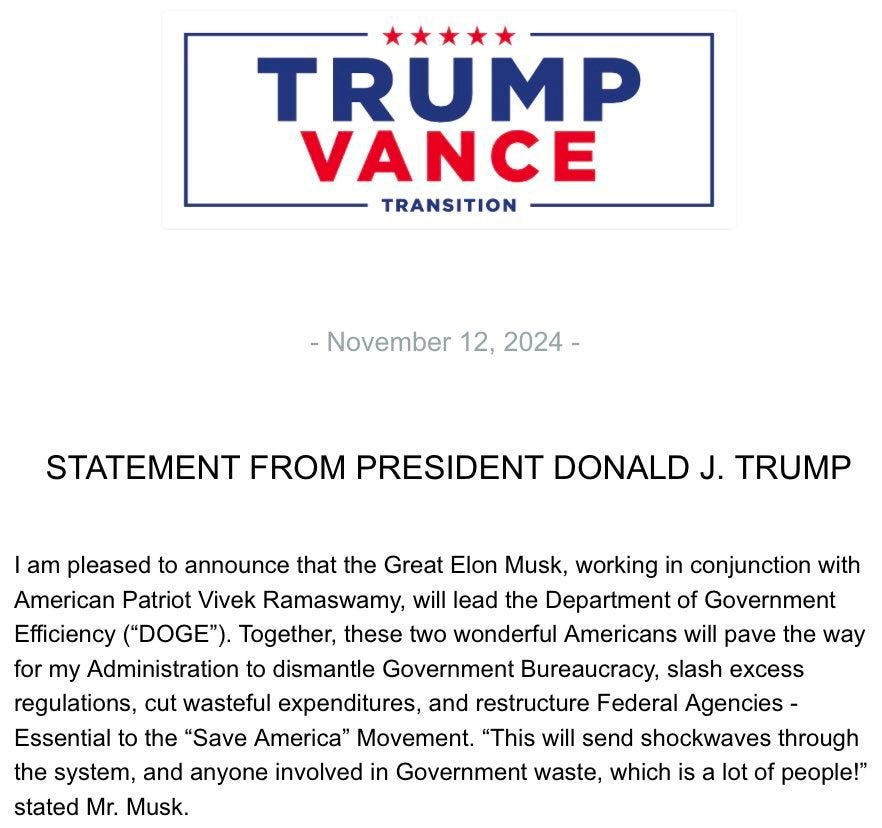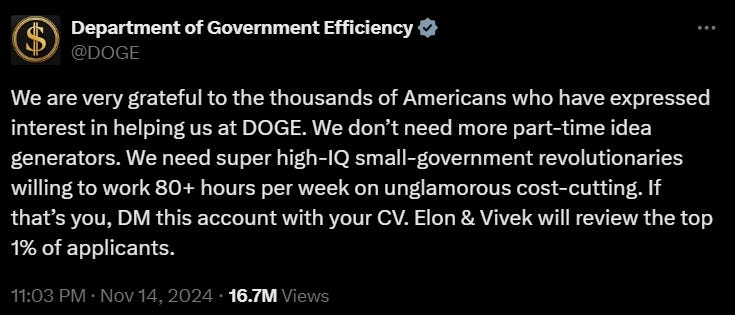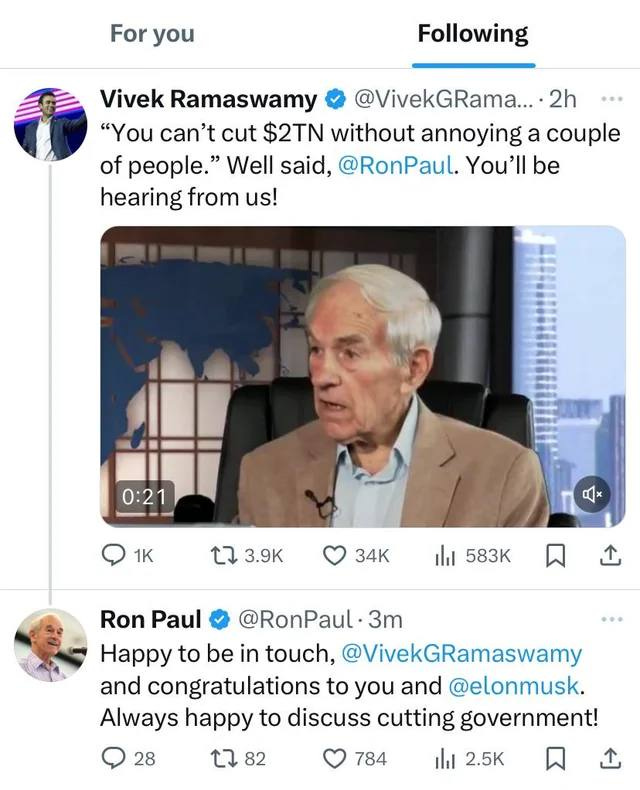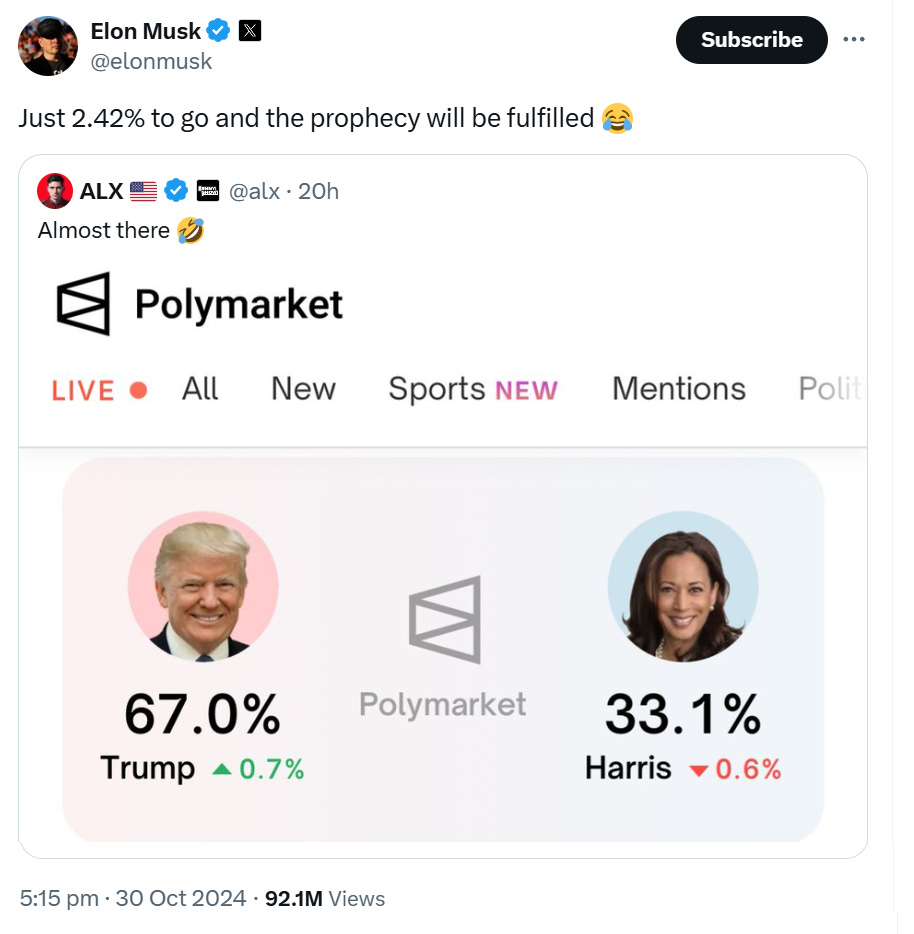Welcome to episode 9 of weekly freedom news, on Network States, individual sovereignty, Libertarian progress, developments in privacy (tech), hard money, economic (de-)regulation and more.
We’re late this week, but will resume to send the brief on Fridays from next week.
A small government is not just about efficiency; it's about freedom. When government is limited, individuals have more control over their own lives, more opportunities to innovate, and more room to live their own lives.
⚡Top of the Agenda
Praxis Nation tries to buy Greenland and may have to bid against Trump to get it
The Department for Goverment Efficiency (DOGE) is a real thing and may do some good by removing some bad
Polymarket CEO gets arrested because Polymarket says Americans can’t use their platform, but Americans do it anyway
1. Praxis Nation Tries to Buy Greenland
Dryden Brown, CEO of Praxis Nation, seeks to build a new, crypto-native country, with over $500M in financing to make it happen.
Now, he wants to buy Greenland, or actually some part of it, which he explains in a thread on X. The country has plenty natural resources, a strategic location, and hardly any people, as just over 50k people live there.
President-elect Trump already tried to buy it in 2019, which sparked Brown’s interest. (And now Trump may want to buy it again.)
Greenland is controlled by Denmark, and has the power to accede whenever they so please. They really do, according to the Self-Government Act. 97% of Greenlanders want to do it, but it doesn’t happen, because Denmark sponsors $500M annually to fund Greenland's government. Political parties don’t want to lose this funding, as it represents ~50% of the government budget. Which means that they say they want to do it but don’t really want to do it.
A solution could be: replace Denmark's annual $500M with new revenue sources. Maybe taxes, mining, tourism? What about taxes from a new city? They have plenty of land!
How could Praxis help?
It could make a deal with Greenland, to buy, with some of that $500 million dollars, “uninhabited, unused territory, for the development of a tax-paying charter city, or perhaps something bigger, with deeper independence: A privatized charter state.”
This charter state could:
Try to improve the climate through various Terraforming technologies.
Build an industrial base, with nuclear energy.
Attract more businesses, tourism, residents.
Pay taxes.
There would be joint ownership by Praxis Citizens, the Greenlandic government, and individual Greenlanders, and all of it represented by (cryptocurrency) tokens.
Brown sees Greenland as a prototype for future colonization efforts, such as Mars. Terminus is Musk’s name for a city on Mars, for which Brown wants to build a prototype.
It makes a lot of sense to us to find areas of land unused by anyone, to use for new experiments in policy, but the status quo makes this difficult. Why? If Greenlanders aren’t even there, why not give it a go.
2. The Department for Goverment Efficiency (DOGE) is a Real Thing
During Trump’s Presidential campaign he promised to create a government efficiency organisation to reduce spending and decrease regulatory baggage across government departments.
On November 12 2024, the president-elect officially announced a new agency that had already been hinted at by Elon Musk: the Department of Government Efficiency (DOGE). It plans to cut $2 trillion in government spending annually.
DOGE will operate outside of government and disband by July 2026.
DOGE will be led by Elon Musk and Vivek Ramaswamy.
DOGE is also a famous cryptocurrency that Elon Musk thinks is funny, hence the reason the agency got its initials. There is also another cryptocurrency named D.O.G.E., on the Ethereum blockchain, which directly points at the government agency. It reached a market capitalization of over half a billion dollars, the day after the agency was announced. The cryptocurrency has its own site with, among other things, a government spending tracker. The cryptocurrency does nothing and is not officially related to the real agency in any way.
Musk and Ramaswamy will serve as ‘special government employees’ which allows them to avoid asset disclosure requirements during their tenure at DOGE.
The goal is to drive structural reform and create an "entrepreneurial approach to Government."
DOGE plans to target "waste, fraud and abuse" which has had mixed results in the past.
These past failures have largely been political with Democrats and Republicans both reluctant to cut spending for their partisan programs and services.
There have even been past deficit reduction efforts like the Simpson-Bowles commission, which have failed.
Created in 2010 by President Barack Obama, and more formally known as The National Commission on Fiscal Responsibility and Reform (NCFRR), Simpson-Bowles was a bipartisan Presidential Commission aimed at reducing the deficit.
In their own words, they tried to create “policies to improve the fiscal situation in the medium term and to achieve fiscal sustainability over the long run.”
Serious cuts for DOGE would likely target popular programs like Social Security and Medicare and Trump has publically said he would like to disband the Department of Education and give the power back to the states.
Indeed, Ramaswamy expresses that he expects “certain agencies will be deleted outright”.
Musk posted on X.com, saying,
“All actions of the Department of Government Efficiency will be posted online for maximum transparency.
Anytime the public thinks we are cutting something important or not cutting something wasteful, just let us know!
We will also have a leaderboard for most insanely dumb spending of your tax dollars. This will be both extremely tragic and extremely entertaining”
The official X.com DOGE profile has called for intelligent (super high-IQ) individuals to apply.
Ron Paul, the former Libertarian candidate, is happy to help, although he expressed skepticism: “government efficiency is an oxymoron”. LOL
The economist Tyler Cowen is optimistic, and writes that DOGE could do a lot of good, if it focuses on the right goals. It is not easy in the US to simply fire a lot of bureaucrats, or even disband entire agencies (as Ramaswamy and Trump do suggest) meaning that we would expect different outcomes from, for instance, Milei in Argentina, who cut government spending by 32%, (and is also excited about DOGE). However, according to Cowen, there are sectors of the economy that could see simpler-than-firing-everyone de-regulation, with potential great effect. He mentions AI, cryptocurrency, medicine, medical trials, and zoning laws as possible areas of interest.
3. Polymarket CEO Arrested
Last week we mentioned how Polymarket, a betting market that allows users to wager on anything, operates from the US, but doesn’t allow Americans to use it. The problem is, it’s really easy for Americans to use it anyway.
The FBI raided the home of Shayne Coplan, the 26-year-old CEO of Polymarket, as part of an investigation into whether Polymarket violated federal laws by allowing US residents to use it anyway,.
Polymarket has repeatedly stated that it does not permit US residents to trade on its platform, but the decentralized nature of blockchain technology makes enforcement challenging. (Which is another way of saying that Americans use it anyway and Polymarket does not really stop them because they can’t and of course don’t really want to.)
Coplan accused the current administration of political retribution and framed the investigation as an attack on innovation and free enterprise.
The Department of Justice (DOJ) is investigating Polymarket’s compliance with US laws. (Betting on US elections was illegal, but is now OK.)
The central question is: if you don’t allow US citizens to use your platform, but it is trivial for them to do it anyway, did you really prohibit them from using it, and whose responsibility is that now?
Also this week
Trump’s shift in priorities will see slowdown in crypto enforcement.
A Chinese Libertarian medical city? I’m sure Ron Paul would call that an oxymoron too.
Interesting media
At the recent Free Cities’ Liberty in Our Lifetime conference, economist Per Bylund gave a speech in which he explains how value in an economy is created by entrepreneurs. Recommended.
Events
Ongoing: The Network School, Near Singapore: September 23 - December 23, 2024.
Ongoing: Crypto City Builders - Exploration Program, Próspera ZEDE, Roatán, Honduras: October 19th - November 25th, 2024.
Ongoing: ZuGarden, Bangkok and an Island in Thailand: 10 - 30 November, 2024.
Parallel Society Congress, Bankok, Thailand: 11 November, 2024.
Adopting Bitcoin, San Salvador, El Salvador: 15 - 16 November, 2024.
Safe Harbor Summit, Vitalia City, Próspera ZEDE, Honduras: 16 - 17 November, 2024.
Vitalia Startup Demo Day, Vitalia City, Próspera ZEDE, Honduras: November 18th, 2024.
Vitalia Forever, Vitalia City, Prospera ZEDE, Honduras: January 6th - March 3rd, 2025.
Edge Esmeralda 2025, Healdsburg, CA, USA: April 24th - June 21st, 2025
See based.guide’s event page for all events.








